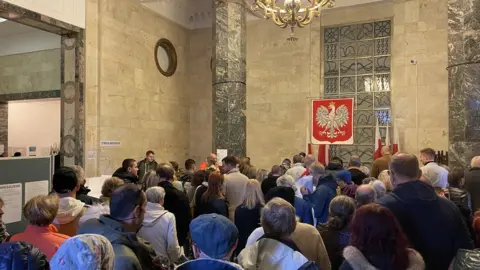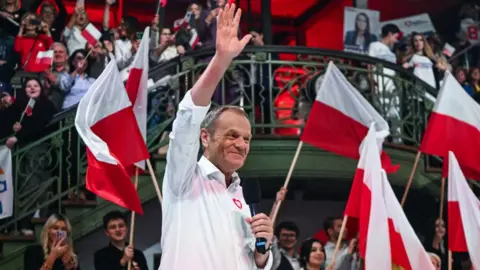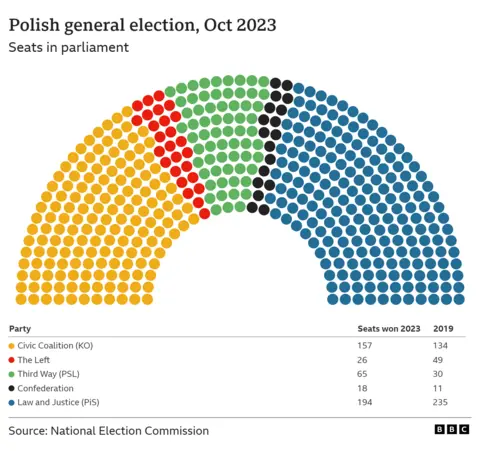Poland election: Women and youth force PiS from power
 Szymon Szumniak
Szymon SzumniakIt was 01:33 on Monday when Szymon Szumniak dropped his voting slip into the ballot box at Wroclaw Polling Station No 148.
The entertainment blogger had been queuing in the biting cold with hundreds of others for six hours, long after the polls should have closed.
The giant queue has become a symbol of the high level of engagement with Poland's parliamentary election, where a record high turnout of over 74% ousted the right-wing Law and Justice party, or PiS, from power.
"People gave us blankets, hot tea, cookies. The hospitality of residents in that area was incredible!" said the 26-year-old of his long wait to vote.
At one point, a group of women broke into song. At another, a local pizza company delivered heaps of free food. The firm was so inundated with donations the next day from grateful Poles, it began redirecting the cash to charity.
Szymon never once thought of giving up and going home.
"We're building our future and I think a lot of young people understood that," the blogger told me from Wroclaw.
He didn't want to reveal who he voted for but was "happy with the way things turned out."
"The queue was long and painful because it was so cold. But the people made it a cool experience."

The final ballot in Polling Station 148 was cast by Michal Wittenbeck, who posted a photograph of his watch on social media to record the moment.
It was 02:41.
Youth vote for change
Polls show that 68.8% of voters aged under 29 turned out on Sunday, a major surge from 46.4% at the last parliamentary election in 2019.
More young people cast their ballots this time than the over-60s, which is also highly unusual.
Many of them voted for change.
Wroclaw is a case in point: Jagodno, the suburb with the huge queue, is described by locals as a modern estate with a young population. The opposition Civic Coalition won 43.6% there. PiS got just 5.9%.
The major parties didn't pay particular attention to the youth vote during an extremely negative election campaign. Instead, the government claimed Civic Coalition would bring chaos, including unlimited migration, and called its leader Donald Tusk a stooge of Europe.
Mr Tusk went on the attack too, painting PiS and its leader, Jaroslaw Kaczynski, as a threat to democracy itself.
That message chimed better with younger voters.

On ballot-count day, students outside the University library in Warsaw were glued to their phones nervously checking for updates to the election result between lectures.
Marta had "cried with excitement" when the first exit poll was published on Sunday night, showing that PiS had lost its majority in parliament and was unlikely to form a government.
Rose was "overwhelmed with joy," describing the first election she had ever voted in as critical "either for preserving democracy or saying goodbye to it".
Another Marta said her parents had been planning to vote for PiS, but she talked them out of it.
"I want to stay in the EU and I want a future in this country. It's that simple," she explained.
The PiS government has been locked in dispute with Brussels over the rule of law, LGBT rights and migration amongst other things. Donald Tusk, a former president of the European Council, is expected to bring more constructive relations.
Smart voting
The high turnout, including at polling stations overseas, was just one sign of how engaged Poles were with this election.
There was also a concerted effort to make sure that every ballot cast for the opposition would count.
The #WarsawTrip online campaign urged people to move their registration out of big cities like Warsaw, to give their vote more weight in the complex Polish electoral system.
Activists produced maps showing people the best places to go: smaller towns, where the race was close, and with proportionally more MPs per vote than in Warsaw.
 Getty Images
Getty Images"If you want to take away the PiS mandate, leave the big city," a typical post read on social media, reassuring people that such strategic voting was perfectly legal.
In one constituency close to Warsaw, the campaign saw Civic Coalition win slightly more votes than PiS. In 2019, the result was 41%-29% to PiS.
Celebrities also took to social media in droves, urging people just to turn out and take part.
The idea that this election was a last chance to stop a populist government from turning Poland away from the EU and some of its core values was a major motivator.
'Don't mess it up'
So was the chance to give women a bigger say in Polish politics, especially after a near-ban on abortion prompted enormous street protests in 2020.
"The women of this country have been silent for too long," said Anna Pieta, who helped organise a social media campaign.
PiS has many women supporters, thanks largely to its generous programme of social spending including child benefits.
But Anna's group, Wschod, realised that many potential opposition supporters were undecided ahead of the election.
So they produced a video depicting women, a middle finger hushing their lips, against a soundtrack of male Polish politicians dismissing or insulting women, who make up 52% of the Polish population.
"The message was: use your voice. Go and vote," Anna explained.

In the end, the turnout among women was slightly higher than men.
Poland's president may ask PiS, as the single party that won the most votes, to try to form a government. With no significant allies in parliament, that looks impossible.
So opposition parties are already making their plans.
Once a new government is in place, abortion is one of the hot issues they'll have to contend with.
The Civic Coalition and Left parties have both promised terminations on demand up to 12 weeks, overturning tight restrictions introduced under the socially conservative PiS government.
"They got a mandate from a society that wants this so I don't know what else there is to discuss," said Anna, dismissing the idea that reforming the abortion law would be tough.
"We put them there. Now it's time to perform."
"Don't mess it up."


